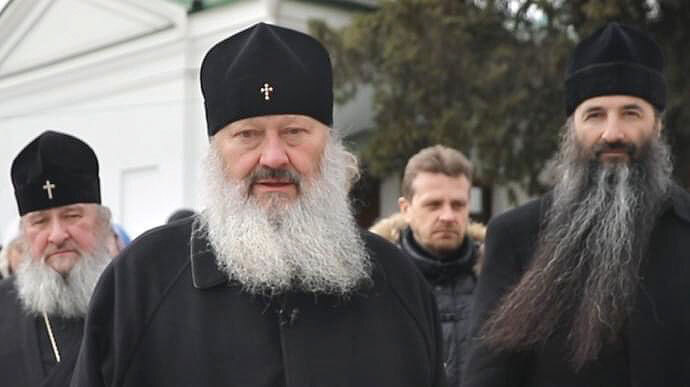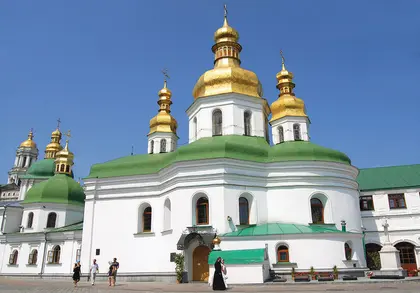The Ukrainian-affiliated branch of the Russian Orthodox Church is being told to vacate the centuries-old Monastery of the Caves, known better as the Kyiv Pecherska Lavra, in another move by Kyiv to reclaim its historical and spiritual heritage.
The church group, which allegedly has had close affiliations with Russian intelligence, has been a promoter of Kremlin policy and has often been allegedly supportive of subversive groups since 2014 and before, was issued an eviction notice on March 10 by Ukraine’s Ministry of Culture and Information Policy.
JOIN US ON TELEGRAM
Follow our coverage of the war on the @Kyivpost_official.
The compound is owned by the Ukrainian government and is a UNESCO cultural heritage site.
In January, the members of the non-canonically recognized church were forewarned that their lease of space they use on the historical site would expire on March 29 without renewal. The Lavra is considered to be Ukraine’s most important monastery and dates to the rule Prince of Yaroslav the Wise in the early 1000s and is lauded for its Byzantine architectural design.
The notice earlier this month partially outlined the terms of the current lease that dates to July 19, 2013, when the occupants were granted free use of the buildings they use on the compound under then-President Viktor Yanukovych who is a fugitive wanted in Ukraine for high treason and is believed to be residing in Russia.
In announcing that it would not renew the lease, the ministry alleged that clerics at the Lavra had violated the terms of the lease agreement with regard to sanctions imposed by the National Security and Defense Council in December 2022.

ISW Russian Offensive Campaign Assessment, January 21, 2025
The head of the clerics at the compound, Metropolitan Pavlo Lebid, defied the eviction notice on March 13 in a video that was posted on YouTube and other social media platforms. He said he has no intention of vacating the premises.

A screenshot of Metropolitan Pavlo Lebid, a high-ranking cleric in the Moscow-affiliated branch of the Ukrainian Orthodox Church, as seen on March 13 speaking on the grounds of the Pecherska Lavra (Monastery of the Caves) in Kyiv where he vowed not to leave the premises despite a government-issued eviction notice.
Standing with other high-ranking clerics and supposed pilgrims outside the compound, Metropolitan Lebid, who is a former lawmaker in the Kyiv City Council, maintained that “we are not [Russian] collaborators.”
“We are citizens of our state, people who have lived [in the monastery] since 1988. Many of us have no other place than here. No one can tear us away from God’s love,” he said.
In a July 11, 2019, interview with the Ukrainian Segodnya newspaper, Metropolitan Lebid said Ukraine was the aggressor in the ongoing war that Russia started in 2014 when it forcibly seized the Crimean Peninsula and covertly invaded the two easternmost regions of Luhansk and Donetsk. In addition, he has said that “Crimea has never been Ukrainian.”
He tenure as city councilman from 2008 to 2014 as a member of the pro-Kremlin Party of Regions coincided with Yanukovych’s membership in the party. He ascended to the presidency with the backing of industrial oligarchs and Russian persuasion.
President Volodymyr Zelensky reinforced Kyiv’s stance against the Lavra’s occupants by stating in his nightly address to the nation on March 12 that he will not allow Russia to assert its will through the compound or steal its historic treasures.
“We will not allow the terrorist state to have any opportunity to manipulate the spirituality of our people, to destroy Ukrainian shrines – our Lavras – or to steal any valuables from them,” he said.
In May 2022, after Patriarch Kirill of Moscow constantly made public statements in support of Russia’s repeat invasion of Ukraine that year, the Ukrainian branch said it had severed ties with Moscow.
After the rupture of ties, the Russian Orthodox Church, which considers the Ukrainian Orthodox Church its own, called the Lavra eviction of its monks “the apogee of lawlessness.”
In what is called a schism in the religious world, critics alleged that the changes were insignificant and hadn’t reshaped the overall situation, including the Ukraine-based church’s status.
For years, the Russian-backed church was suspected of harboring pro-Russian views and giving shelter to Moscow operatives.
A November 22, 2022, “counterintelligence” search by the Security Service of Ukraine (SBU) at the Lavra and other premises run by the Russian church throughout the country discovered hundreds of thousands worth of dollars in cash, pro-Kremlin literature and Russian citizens living at the compounds with spurious passports and loose biographies of why they were there.
Igor Girkin, the former Russian special forces operative who is known for sparking the armed part of the war in eastern Ukraine in 2014, has also been documented as being a security guard and a “pilgrim” who visited the Pecherska Lavra that year.
Four years later, Ukraine’s first war-time president, Petro Poroshenko, sanctioned the entities of Marshal Capital and the Basil the Great Foundation, both belonging to Russian oligarch Konstantin Malofeev, for allegedly financing war efforts against Kyiv in the eastern part of the country.
His foundation had brought the “Gifts of the Magi” icon from Greece to Ukraine in 2014, when Girkin was identified as being one of the security guards during the Russian-affiliated church’s yearly religious march known as the “procession.”
Under Poroshenko’s presidency, the Ukrainian Orthodox Church in 2019 officially received a Tomos, making it a canonically recognized independent church. It had been subjugated to Moscow for centuries and the Kremlin considered its independent alternate a renegade church.
The Tomos, which in Greek means a roll of voluminous paper, was granted by Ecumenical Patriarch Bartholomew in 2019 to Moscow’s chagrin. Based in Istanbul, Turkey (formerly the city of Constantinople), Bartholomew is considered the “first among equals” in Orthodoxy’s hierarchy.
Administrators of the Lavra at Ukraine’s Ministry of Culture and Information Policy have for years complained they couldn’t control what the Russian-backed tenants at the site were doing in terms of property development at the site.
According to UNESCO, “housing, urban development pressure, legal framework and management systems” are “factors affecting the property.”
“The architectural ensemble of Kyiv Pechersk Lavra comprises unique surface and underground churches from the 11th to the 19th centuries, in a complex of labyrinthine caves that expands more than 600 meters, as well as domestic and household buildings from the 17th to the 19th centuries,” the UN agency says. “The architectural ensemble acquired its modern aspect as a result of construction activities in the 17th to the 18th centuries in the heyday of the Ukrainian Baroque.”
Reprinted with the author’s and editor’s permission from the Ukrainian Weekly issue from March 17, 2023. See the original here.
You can also highlight the text and press Ctrl + Enter










